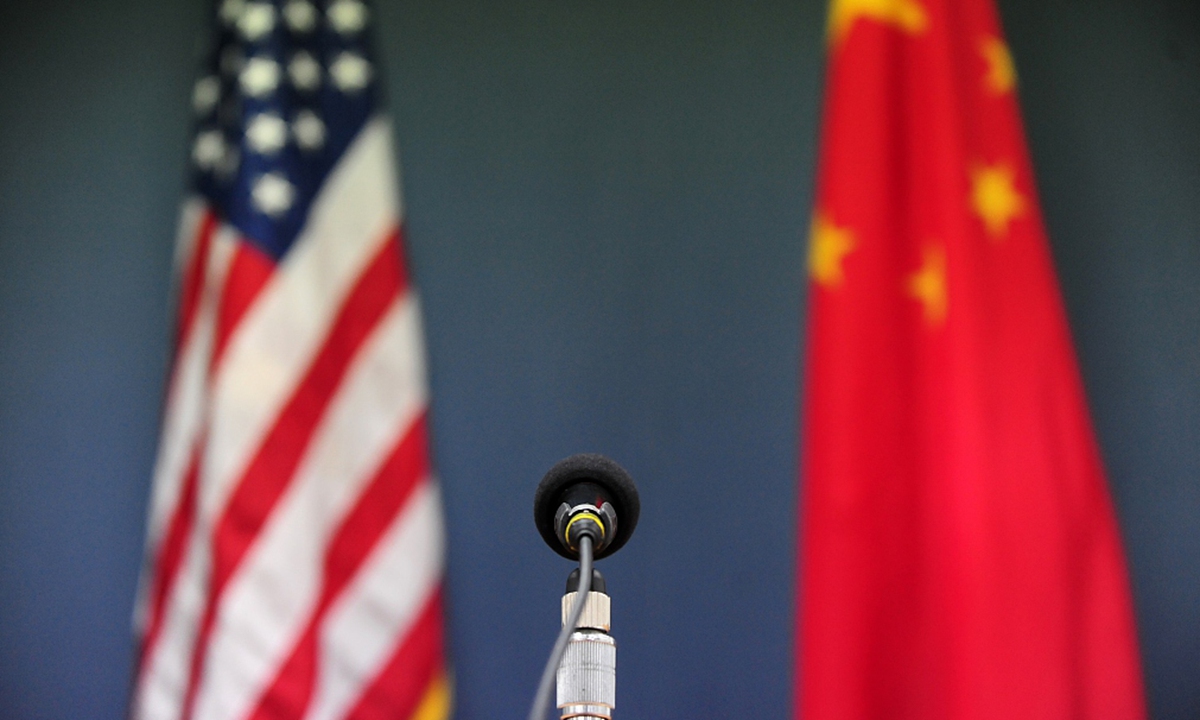
China US Photo:VCG
China and the US, the two biggest major powers in the world that have been at loggerheads, are set to kick off a high-level meeting in Alaska after a series of contests and frictions.
The atmosphere before the talks is not friendly at all since the US has launched a new round of provocations and offensives against China, such as announcing new sanctions against Chinese officials regarding Hong Kong's electoral reform, an internal affair of China, and in response, the National People's Congress (NPC) Standing Committee said in a statement released on Thursday that the US' move to use Hong Kong as an excuse to recklessly interfere in China's domestic affairs is "unreasonable" and "vicious." The Chinese Foreign Ministry also previously said China will take countermeasures.
Such a tense situation didn't see the two sides cancel the meeting, which shows that the two countries have attached extremely high importance to this meeting, said analysts.
First meeting
At the invitation of the United States, top Chinese diplomats and other delegates travelling with them, the first foreign delegation to visit the US since the inauguration of new US President Joe Biden, arrived at Anchorage, Alaska, one of the coldest places on US soil with a freezing temperature of minus 19 degrees Celsius, for the upcoming meeting.
The delegation led by Yang Jiechi, a member of the Political Bureau of the Communist Party of China (CPC) Central Committee and director of the Office of the Foreign Affairs Commission of the CPC Central Committee, and Chinese State Councilor and Foreign Minister Wang Yi, will have a "high-level strategic dialogue" with US Secretary of State Antony Blinken and National Security Advisor Jake Sullivan on Thursday.
As agreed by both sides, the four officials will hold three meetings from March 18 to 19, local time, with the first meeting to be held in the afternoon on March 18, local time, media reported.
The Biden administration has unleashed some hostile signals to pressure China ahead of the meeting, some Chinese scholars have even suggested that China should turn down the US' invitation and cancel the meeting. However, Chinese diplomats still attend the meeting.
Chinese experts said this has displayed China's courage to confront the US' tough stance with strength, confidence to bring ties back to normal, and sincerity to seek a chance of cooperation for not just China but also the world that desperately needs major powers to work in tandem.
No compromises
Chinese Ambassador to the US Cui Tiankai arrived in Anchorage on Wednesday and commented on the US' latest actions that have seriously worsened the already tense atmosphere surrounding the meeting.
The US said it will pressure China on a series of issues related to Chinese core interests and sovereignty like Hong Kong, Xinjiang, Taiwan and Tibet, and some media asked if China would make compromises to create a good atmosphere for the talks, Cui responded resolutely that "We will not give in or make any compromises on these matters just to create some 'atmosphere'. Never!"
Cui said that "If anyone believes that the Chinese delegation travels to Alaska…just to give in and make compromises, then I would suggest to my colleagues in Beijing to cancel their trip. Why bother coming?"
Lü Xiang, an expert in US studies with the Chinese Academy of Social Sciences, said that US actions such as announcing a plan to sanction Chinese officials over the Hong Kong electoral reform ahead of the meeting, is just like "a host spitting on the table when inviting a guest for dinner."
Chinese experts said there is at least one task for the Chinese delegation this time - to let the US clearly understand China's unshakable determination regarding its core interests, as the new US administration knows that China won't make any compromises, but it might not understand how China would act and how serious it could be in protecting its sovereignty and core interests.
Pressure on Biden
Ahead of the meeting, some senior US officials have continually downplayed the expectations of the meeting, even saying that the dialogue won't be a normalized mechanism and to what extent it would change the trajectory ties depends on China's deeds not words.
Diao Daming, an expert on US studies at Renmin University, told the Global Times that the reason why Blinken and other senior US officials have released some tough or even hostile signals ahead of the meeting is that "the Biden administration is under great pressure from many extreme anti-China politicians in Washington, in their Congress."
Yang Xiyu, a former Chinese diplomat and senior research fellow at the China Institute of International Studies in Beijing, told the Global Times that sooner or later, the Biden administration has to cooperate with China on some issues, "so being tough right now is designed to balance future criticism and pressure within its country."
That's why the meeting is necessary for the normalization of bilateral ties, because if China cancels the meeting, it would prove the "dialogue is useless" narrative to be correct, and only by letting dialogue take place and at least opening up a path for pulling ties back from the brink, "we are able to prove them (US political forces that oppose dialogue with China) wrong," Diao said.
Yang said the China-US relationship is now at a crossroads, and at "the worst situation since the handshake between Mao Zedong and Richard Nixon." In the future there are only two ways - "back on the right track or back to the situation before diplomatic ties were established, which is a cold war or even a hot war."
The Biden administration has not concluded a comprehensive strategy on China and has no clear framework on its foreign policy, by engaging with China as early as possible, the US could also be able to make its strategy more pragmatic and realistic, said Diao, adding that "issuing policy through dialogue and exchange is always better than cutting off exchanges and inciting confrontation."
What to expect?
Most observers worldwide remain pessimistic or hold very low expectations for the meeting, just like the cold weather in Anchorage, the communication between the two biggest economies won't warm again so soon.
"Since the top leaders of both sides have decided to conduct dialogue, it means they have already evaluated all possibilities that may occur. If the dialogue breaks down eventually, then it would be a lose-lose situation that may be unacceptable for both sides," Yang said.
No matter what the result might turn out to be, China's best choice is to focus on its own business, Yang noted. "The more powerful China becomes, the less unbridled the US would be."
US media also speculated that the meeting could touch upon issues like the potential first summit between Chinese President Xi Jinping and Biden since the latter took office. The VOA reported that Biden could meet virtually with Xi as early as April 22, as Biden hosts the "Global Leaders Climate Summit" in Washington on Earth Day, according to the VOA.
The event is aimed at gathering world leaders to discuss climate change, which Biden has described as "an essential element of US foreign policy and national security."
However, Chinese Foreign Ministry spokesperson Zhao Lijian told the media on Thursday that there is no arrangement for the Xi-Biden meeting yet, and both sides can have exchanges about any topic of their interest, including the meeting between the two presidents.
Diao said the meeting between the presidents is not an urgent task for both sides at the moment, and to what extent both sides can push forward the matter depends on the result of the upcoming meeting. There is hope for reaching some common ground on cooperation, such as shared challenges like climate change, and fighting COVID-19, so the mood doesn't need to be overly pessimistic either.
World is watching
The Chinese Foreign Ministry announced that Russian Foreign Minister Sergey Lavrov will visit China on March 22 and 23, two days after the China-US high-level strategic dialogue in Alaska.
Chinese analysts said that apart from strengthening the China-Russia strategic partnership, the US is also a topic that would interest both Beijing and Moscow. Since the US has consulted with its allies before its meeting with China, China could also share information with its close strategic partner which is facing extreme pressure and hostility recently from the US.
At the interview with media on Wednesday, Ambassador Cui said "there are some big question marks in the minds of the international community…Will the US be a responsible stakeholder in global affairs? Will the US come back with sustained commitment and contributions to multilateral cooperation? Will the US be ready and willing to respect other countries' interests and listen to their voices?"
Cui said "Many countries, including US allies, have such questions. Some just don't say it in public. There are hopes that the US will understand other countries' concerns."


